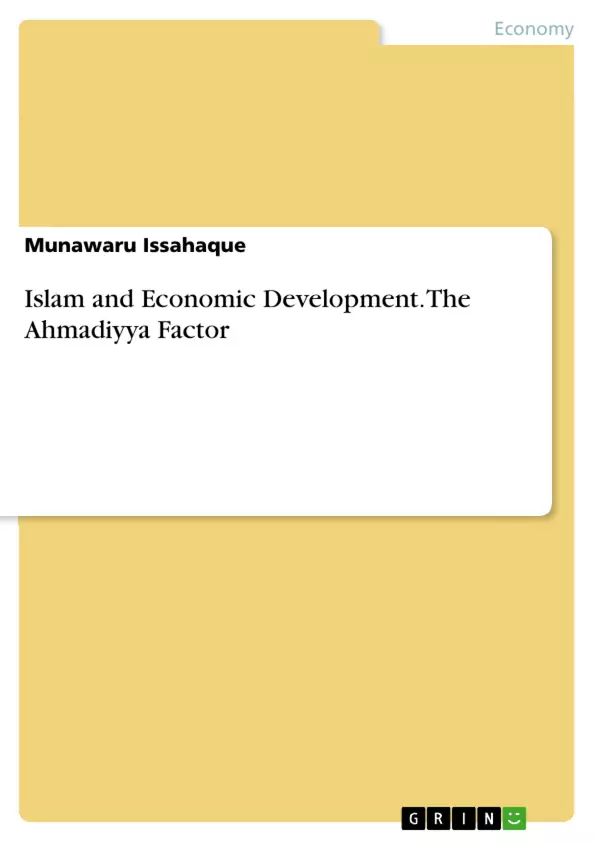Islam and Economic Development-the Ahmadiyya Factor is initially written as an EBook to provide balanced view of Islam in relation to economic development. The writer has been an economics teacher in senior high school for over fifteen years. The writer had also been a student of Islamic Religious Studies at Ordiary and Advanced levels, as well as introductory courses in Quranic Hermeneutics and Old Testament at the university.
The book is written with the aim to show readers that Islam does teach laziness, nor does Islam encourage Muslims to be poor. Islam and Economic Development is also written to show that Islam teaches muslims to be hardworking, truthful, honest, generous, kind to parents and neighbours, caring for the development of their societies, and more importantly to be submissive to will of Allah and peaceful to fellow humans and all creatures.
Inhaltsverzeichnis (Table of Contents)
-
- INTRODUCTION….
- Meaning of Islam.
- THE AHMADIYY FACTOR
-
- THE GOAL OF ISLAM.
-
- THE WORLDVIEW OF ISLAM
- KHILAFA (Vicegerancy of Human Being)
- FUNCTIONS OF KHILAFAT
- THE BLESSINGS OF KHILAFAT
- KHALITUL RASHIDUN AFTER THE HOLY PROPHET (SAW)..
- Hazrat Abubakar Ibn Abiqahafa
- Hazrat Umar Ibn Khattab
- HAZRAT UTHMAN BN AFFAN
- HAZRAT ALI
- THE PROMISE MESSIAH AND MADHI
- (HAZRAT MIRZA GULAM AHMAD OF QADIAN)...
- TEN CONDITIONS OF BAI'AT
- Caliphate after the Promised Messiah and Mahdi..
- HAZRAT MAULANA ALHAJ NOORUDIN
- HAZRAT MIRZA BASHIRUD-DIN MAHMUD AHMAD
- HAZRAT MIRZA NASIR AHMAD.
- HAZRAT MIRZA TAHIR AHMAD
Zielsetzung und Themenschwerpunkte (Objectives and Key Themes)
This book aims to provide a balanced perspective on the relationship between Islam and economic development, highlighting the contributions of the Ahmadiyya Muslim Community. The author, an experienced economics teacher with a background in Islamic Religious Studies, seeks to dispel the misconception that Islam encourages laziness and poverty, instead demonstrating its emphasis on hard work, honesty, and social responsibility.
- The role of Islam in promoting economic development
- The Ahmadiyya perspective on economic principles and practices
- The concept of Khilafa (Vicegerancy of Human Being) and its implications for social and economic progress
- The legacy of the early Caliphs and their influence on economic development
- The teachings of the Promised Messiah and Mahdi (Hazrat Mirza Ghulam Ahmad of Qadian) in relation to economic justice and social welfare
Zusammenfassung der Kapitel (Chapter Summaries)
- Chapter One: Introduction This introductory chapter defines Islam and introduces the "Ahmadiyya Factor," which explores the specific contributions of the Ahmadiyya Muslim Community to economic development.
- Chapter Two: The Goal of Islam This chapter explores the core principles and objectives of Islam, emphasizing its focus on ethical conduct, social justice, and economic prosperity.
- Chapter Three: The Worldview of Islam This chapter delves into the Islamic worldview, emphasizing the concept of Khilafa (Vicegerancy of Human Being) and its role in shaping human responsibility towards both spiritual and material progress. The chapter also explores the functions and blessings of Khilafa, highlighting its importance for societal development.
Schlüsselwörter (Keywords)
The book centers on the key themes of Islam, economic development, the Ahmadiyya Muslim Community, Khilafa (Vicegerancy of Human Being), ethical conduct, social responsibility, and the legacy of the early Caliphs.
Frequently Asked Questions
Does Islam discourage economic development or encourage poverty?
No, the book explains that Islam teaches Muslims to be hardworking, honest, and productive, and it does not encourage laziness or poverty.
What is the "Ahmadiyya Factor" in relation to economic development?
It refers to the specific contributions and interpretations of the Ahmadiyya Muslim Community regarding economic principles, social responsibility, and ethical conduct.
What is the concept of Khilafa in the Islamic worldview?
Khilafa refers to the "Vicegerancy of Human Being," emphasizing human responsibility to manage the world's resources justly for spiritual and material progress.
Who was Hazrat Mirza Ghulam Ahmad of Qadian?
He is the Promised Messiah and Mahdi, whose teachings emphasize economic justice, social welfare, and submission to the will of Allah.
How did the early Caliphs influence economic development?
The book explores the legacy of Caliphs like Hazrat Abubakar and Hazrat Umar, highlighting their roles in establishing justice and societal development.
What are the core ethical values Islam promotes for society?
Islam promotes truthfulness, honesty, generosity, kindness to neighbors, and caring for the development of the community.
- Quote paper
- Dr. Munawaru Issahaque (Author), 2018, Islam and Economic Development. The Ahmadiyya Factor, Munich, GRIN Verlag, https://www.grin.com/document/491810



